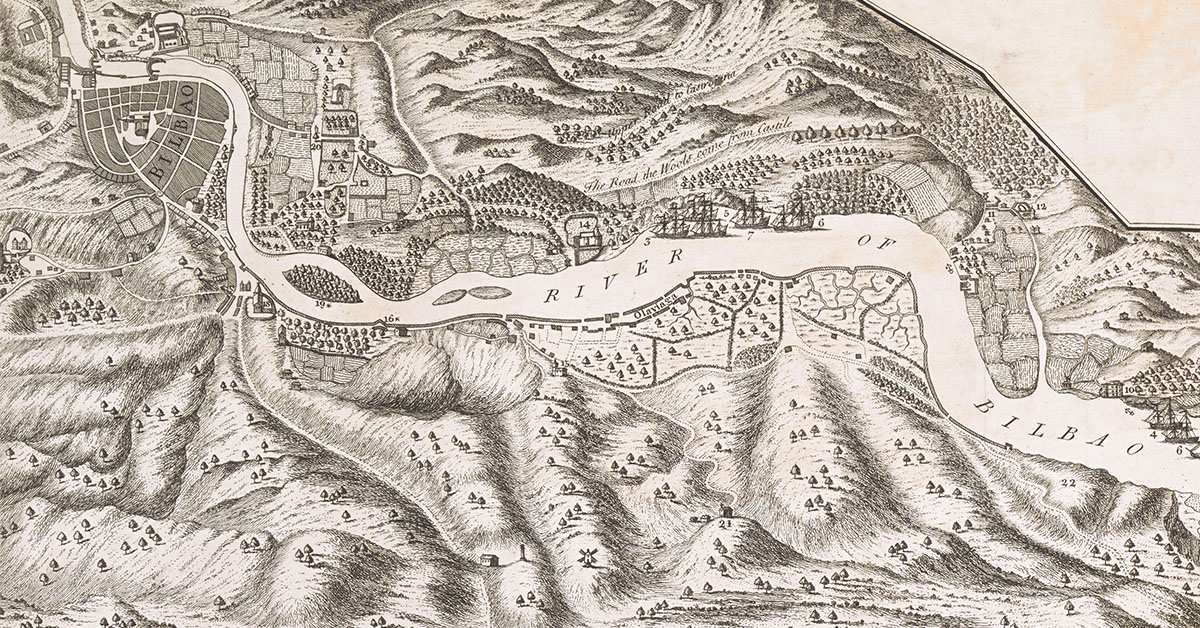Basque ethnography at a glance

Detail of the 1739 draught of the Bilbao river estuary, by Gabriel Baudwin (British Library), lent by courtesy of Jabier Aspuru. The Olabeaga area, with 5 sailing ships moored, is in the centre.
World Pizza Day has been marked on 9 February for half a dozen years or so. It seems the day started in the USA and has gradually spread to the other countries, and is even celebrated in Bilbao. But this article is not going to be about the culinary heritage of pizza, but of something rather better known: salt cod or bacalao in Bilbao, which has been part of our culture for nearly 5 centuries, but still does not have a specific day to honour it. Our culinary heritage contains several recipes and much has been written about salt cod; if we resort to a hackneyed phrase, we could claim that salt cod has been here “forever or from time immemorial”, a phrase that is widely used for something that we believe has always been with us. Eels (txitxardinak) are one such example, and the oldest and specific document I have come across referring to their consumption dates back to the early 19th century and not before. When somebody claims that something is from time immemorial, we can only usually find evidence of two or three generations of time, and reliably no more than 100 years. Anybody is free to argue otherwise, but they should provide some documentary proof.
Our ancestors had to go a long way to fish the cod as we know it; a fact that is documented back to the 16th century, because it was a species that did not thrive in the seas close to us, as was the case of mackerel, anchovies, sardines, tuna or fish with better known migratory customs.
In short, I should point out that, for some time now, I have been studying archives to find documentary details on the ancient craft of milestone masonry, and the stonemason who carved blocks of hard stone to make millstones has already disappeared from the popular memory. Thus, these lines are an introduction to several ethnographic projects I have been working on, some of which are already completed and others still underway.
Those stonemasons also worked with sandstone in Bizkaia in the 16th century, but the uplands are not home to those documents, but just a few remnants and remains that require knowledge to understand them. The documents are in the archives and it is often very difficult to obtain any information, given that they are difficult to read or their state of conservation. I am going to describe the unearthing of an insurance policy for the salt cold that was brought to Bilbao on a vessel, La María, 439 years ago.
The Consulate of the Sea section in Burgo Provincial Archive contains thousands of insurance policies for goods of every type, for the vessels themselves and for the many different maritime areas that were insurable. I have analysed the database with the aim of trying to learn about the fate of the millstones, and I obtained much information on other types of goods, including wool, iron, sugar, wine, whale hunting, and salt cod as well. Thirteen books were analysed, with slightly over 11,000 pages read, and I learnt a great deal about how the ship insurance system operated in the 16th and 17th centuries.
In the case in question regarding the salt cod, the insured capital in the policy was 500 ducats, around €100,000 in today’s currency. No other comment is need as the transcription clearly shows that the voyage was directly from the Olabeaga area to Newfoundland and back, and a resident of Deusto was the master of the vessel. Thus, fishing for cod does date back from time immemorial.
Reference: ADPBU-CM-037, fol. 22r
1584
Invoice of October 84 Sebastian de Larrauri
In the city of Burgo on the twenty-eighth day of the month of April of fifteen hundred and eighty-four, Sebastian de Larrauri insured at the request and on behalf of Pedro de Agurto Gastanaga, a resident of the charter town of Bilbao, the vessel from Olaveaga that is on the river of that charter town of Bilbao to Newfoundland to fish cod, during the outward and return voyages and time there, and including the supplies and provisions on the aforementioned vessel, and on the return and the fish that it will bring back, all of which belongs to Pedro de Agurto Gastanga or to whom it may belong and with eleven per cent to be paid against invoice of October of this year. The master of the vessel entrusted to the salvation of Our Lord and named La Maria is Juan Martinez de Çabaleta, a resident of the hamlet of San Pedro Deusto or any other serving as master, signed the following insurers,
Geronimo de Salamanca and Francisco de Arriaga, in that nao entrusted to the salvation of God for one hundred and fifty ducats at eleven percent to be paid in the month of October of this year and Diego de Castro duly empowered signed it on their behalf on that day.
Francisco de Cuebas for two hundred ducats and Diego de Castro duly empowered signed it on his behalf on that day.
Hernando de Castro Maluenda for fifty ducats and Diego de Castro duly empowered signed it on his behalf on that day.
Francisco de Castro Muxica for fifty ducats and Diego de Castro duly empowered signed it on his behalf on that day.
Alonso de la Torre for fifty ducats and Diego de Castro duly empowered signed it on his behalf on that day.
Entered on the twenty-eighth of April of that year and corrected by me
Alonso de Madrid
Javi Castro
Ethnographic Department – Aranzadi Science Society


